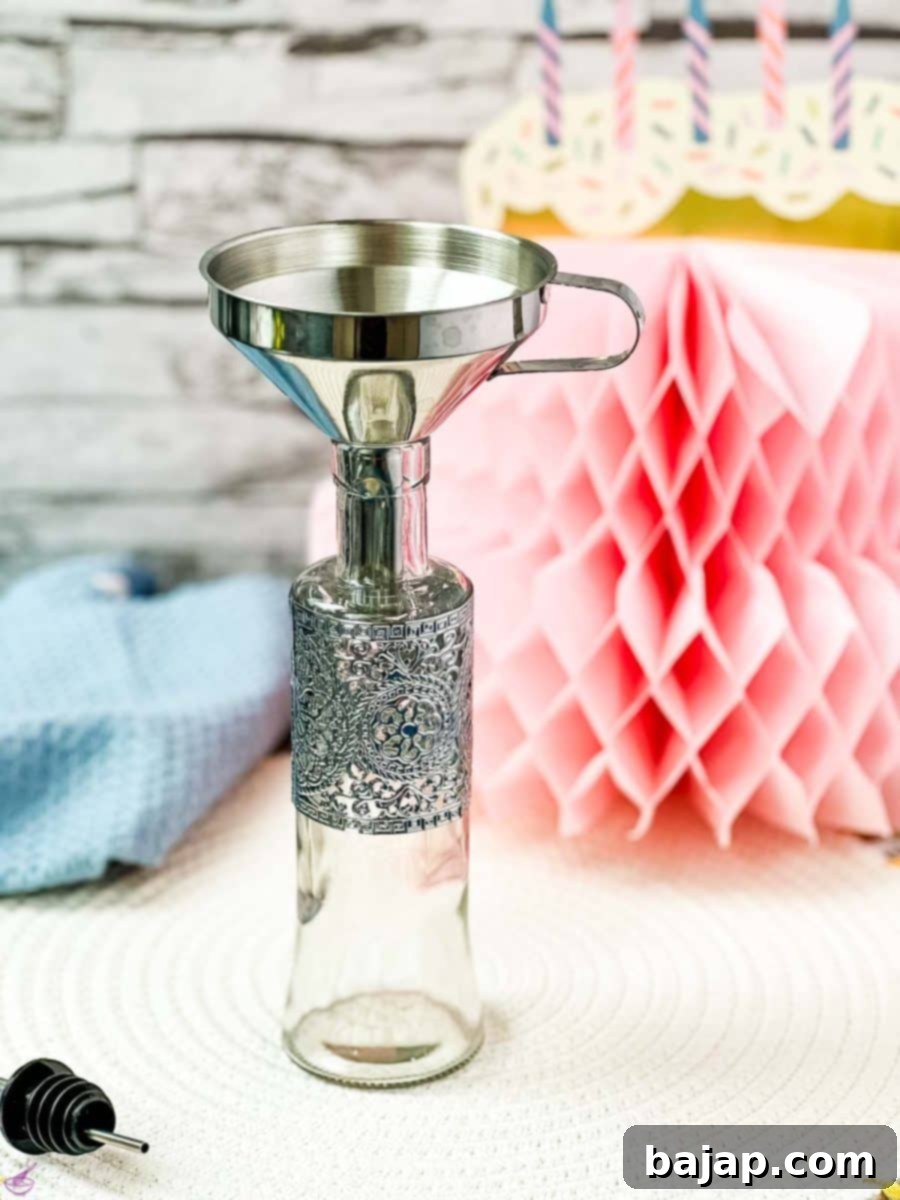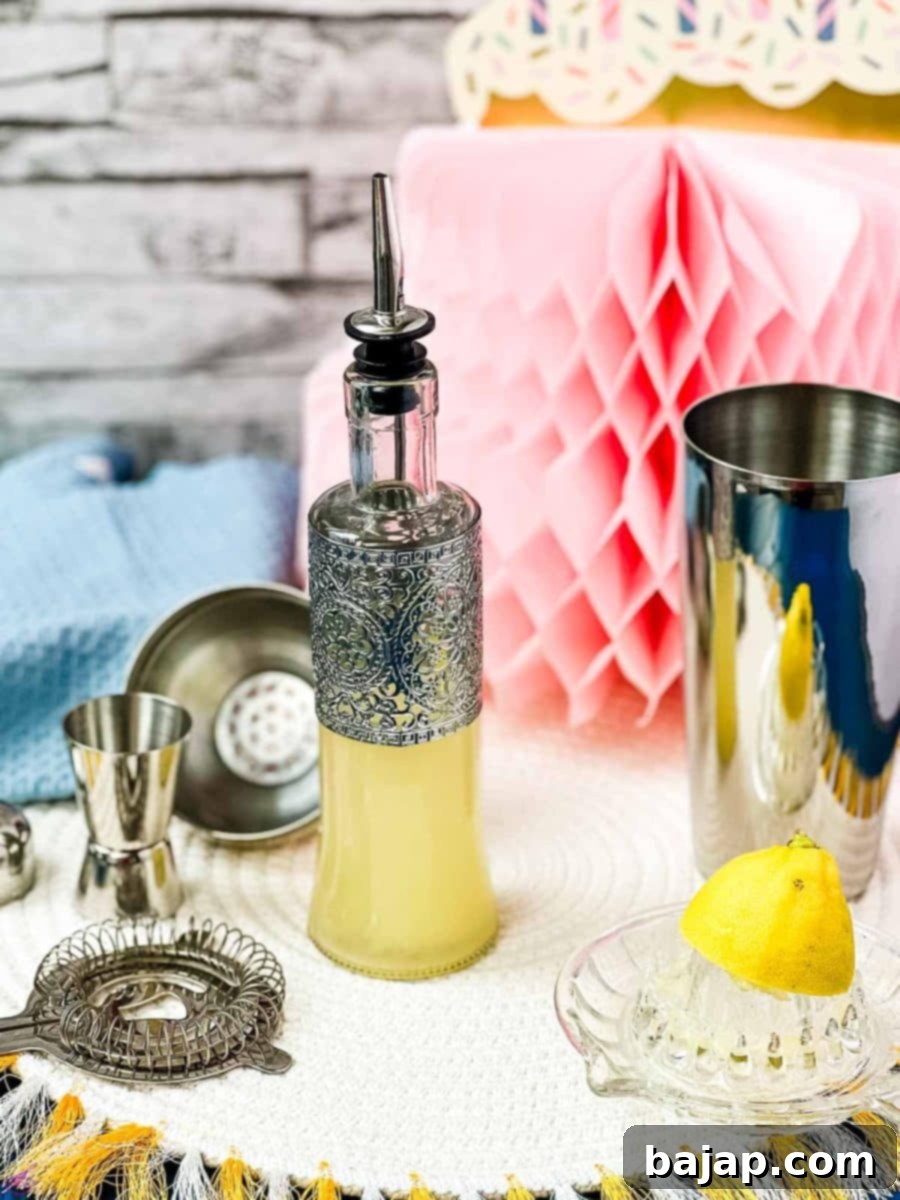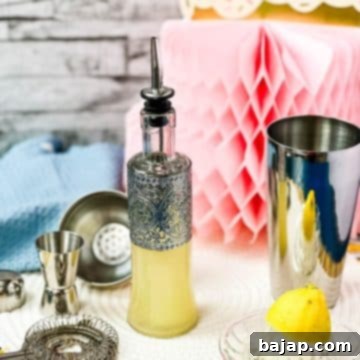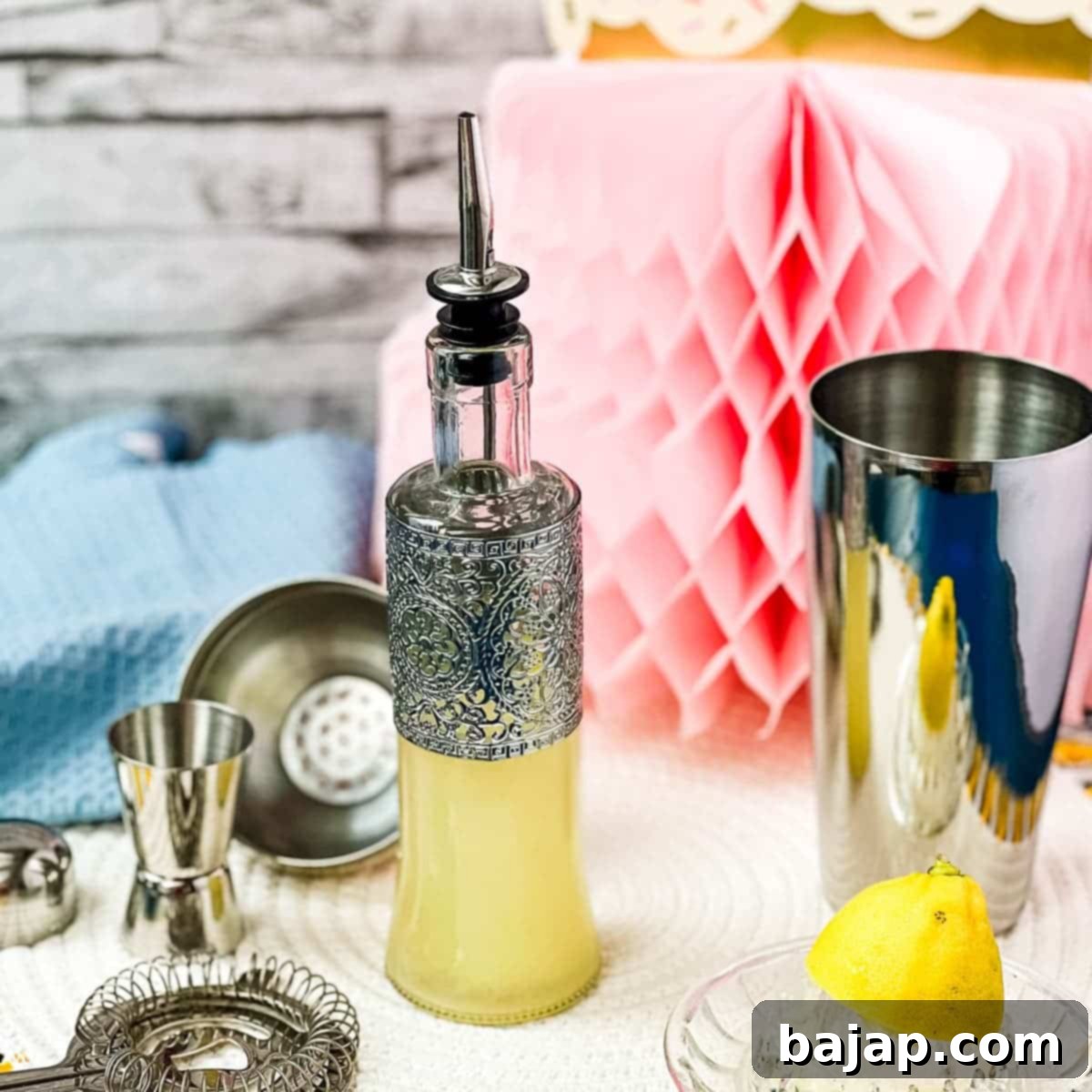The Ultimate Guide to Freshly Squeezed Lemon Juice: Benefits, Uses, & Easy Recipe
There’s an undeniable charm and invigorating zest that only freshly squeezed lemon juice can offer. While it might demand a little more effort and boast a shorter shelf life than its bottled counterpart, the vibrant, authentic flavor and aroma are simply unmatched. This golden liquid is a true kitchen staple, cherished by home cooks, bakers, and mixologists alike, and for good reason.
Beyond being a star ingredient for crafting exquisite cocktails behind your home bar, freshly squeezed lemon juice is a powerhouse of natural goodness. It’s teeming with vital nutrients, making it a valuable addition to your daily routine for health and wellness. If you’re ready to unlock the full potential of this bright citrus, from boosting your immunity to elevating your culinary creations, this comprehensive guide is for you!

Packed generously with vitamin C, potent antioxidants, and essential electrolytes, fresh lemon juice provides a pure, unadulterated boost without any of the added sugars or artificial ingredients found in many store-bought options. This makes it an incredibly versatile and healthy choice for enhancing flavor and nutrition in countless ways.
Whether you’re aiming to supercharge your immune system, improve digestion, or simply add a burst of natural flavor to your food and drinks, learning how to easily prepare and incorporate fresh lemon juice into your lifestyle is a game-changer. Let’s dive in and explore the many wonders of this humble yet mighty citrus!
🍋 Fresh Lemon Juice vs. Bottled Lemon Juice: The Unmistakable Difference
For discerning palates and health-conscious individuals, the debate between fresh and bottled citrus juices often leads to one clear winner: freshly squeezed. While convenience might tempt you to reach for a bottle of store-bought lemon juice concentrate, most culinary experts and home enthusiasts agree that it simply cannot replicate the complexity and vibrancy of juice extracted directly from a whole lemon.
When you squeeze your own lemons, you’re experiencing citric acid at its peak – bursting with bright, layered, and fully pronounced flavors. This isn’t just about taste; it’s about the entire sensory experience, from the invigorating aroma that fills your kitchen to the subtle nuances that elevate any dish or drink. Furthermore, if you have a microplane or zester on hand, you’ll also have the added bonus of fresh lemon zest, an aromatic ingredient that adds even more depth to your recipes and is utterly absent from bottled options.
Bottled lemon juice, often labeled as “lemon juice concentrate,” undergoes significant processing. This typically involves pasteurization, filtration, and the addition of preservatives like sodium benzoate or sodium sulfite to artificially extend its shelf life. These processes, while practical for storage, inevitably strip away many of the delicate volatile oils and enzymes that contribute to fresh lemon’s characteristic bright flavor and aroma. The result is a flatter, often harsher, and less nuanced taste profile that can sometimes carry an artificial aftertaste.
While bottled juice can certainly be a handy emergency ingredient, especially if you don’t have access to fresh lemons year-round or live in a region where they are expensive or out of season, it’s generally best reserved for cooking applications where its flavor is less prominent. For instances where lemon is the star – such as in dressings, desserts, or especially cocktails – the difference in quality is immediately noticeable. If you’re accustomed to the bright, authentic taste of fresh fruit, the substitute will often fall short. So, for a truly superior flavor and nutritional experience, fresh is always the way to go.
🍋 Versatile Uses for Freshly Squeezed Lemon Juice – Beyond Cocktails
While a splash of fresh lemon juice is undeniably fantastic in a crisp gin and tonic or a classic whiskey sour, its utility extends far beyond the realm of mixology. This wonderfully bright yellow fruit is a true kitchen hero, offering a myriad of culinary and health-boosting applications. Of course, making homemade lemonade is a quintessential use, but let’s explore some other incredibly beneficial ways to integrate fresh lemon juice into your daily life.
Health and Wellness Applications:
- Daily Hydration: Start your day with a glass of warm water and fresh lemon juice. This simple ritual can aid digestion, stimulate metabolism, and provide a gentle detoxifying effect. It’s a refreshing alternative to plain water and helps kickstart your system.
- Immune Booster: Thanks to its high vitamin C content, lemon juice is an excellent immune system supporter. A daily dose can help ward off colds and flu, especially during peak seasons.
- Nature’s Electrolyte Drink (Switchel): One of my favorite recent discoveries is the “nature’s Gatorade” or “Switchel” recipe, which has gained popularity for its hydrating and nourishing properties. While variations exist, a common recipe involves a generous half cup of freshly squeezed lemon juice, half a cup of apple cider vinegar, a full cup of freshly grated ginger, and a half cup of maple syrup, all balanced with a pinch of salt and a splash of mineral water. This concoction is incredibly tangy, spicy, and packed with electrolytes, offering a natural and healthier alternative to commercial sports drinks, free from artificial flavors and excessive sugars. It’s perfect for post-workout recovery or simply staying well-hydrated throughout the day.
- Sore Throat Remedy: Mix lemon juice with honey and warm water for a soothing concoction that can alleviate sore throat pain and coughs.
Culinary Applications:
- Marinades and Dressings: Lemon juice is a fantastic tenderizer and flavor enhancer for meats, poultry, and fish. It’s also the base for countless vinaigrettes and salad dressings, adding a bright, acidic kick.
- Baking and Desserts: From lemon meringue pie to lemon bars, the tang of fresh lemon juice is indispensable in many sweet treats. It balances richness and adds a delightful aromatic quality.
- Prevent Browning: Drizzle lemon juice over sliced apples, avocados, or other fruits to prevent them from oxidizing and turning brown.
- Enhance Flavors: A squeeze of lemon juice can brighten the flavors of soups, stews, sauces, and vegetable dishes, acting as a natural seasoning.
- Homemade Lemon Curd: A luxurious spread for toast, scones, or as a filling for tarts, homemade lemon curd showcases the rich flavor of fresh lemon juice.
Embracing freshly squeezed lemon juice in these diverse ways not only enhances the taste of your food but also contributes significantly to a healthier, more vibrant lifestyle. The pure, unadulterated goodness of real lemons is truly a gift that keeps on giving.
🍋 The Extensive Benefits of Fresh Lemon Juice
The health benefits attributed to fresh lemon juice are truly remarkable and span a wide range of bodily functions. This bright citrus isn’t just a flavor enhancer; it’s a potent natural remedy and a nutritional powerhouse that can significantly contribute to overall well-being. Let’s delve deeper into some of the extensive advantages of incorporating fresh lemon juice into your diet.

Key Nutritional Contributions:
- Vitamin C Powerhouse: Lemons are famously rich in Vitamin C (ascorbic acid), a crucial antioxidant that supports the immune system, aids in collagen production for healthy skin, and helps protect cells from damage caused by free radicals.
- Rich in Antioxidants: Beyond Vitamin C, lemons contain other beneficial antioxidants like flavonoids, which help combat oxidative stress and inflammation throughout the body.
- Essential Minerals: They provide valuable minerals such as potassium, important for blood pressure regulation, nerve function, and muscle contraction, and a good source of folate, which is vital for cell growth and function.
Specific Health Benefits:
- Aids Digestion: The citric acid in lemon juice can stimulate the production of digestive juices, helping to break down food more efficiently and potentially alleviating symptoms of indigestion and bloating. Some people find that lemon water first thing in the morning acts as a gentle laxative.
- Supports Kidney Health: Regular consumption of lemon juice can help prevent the formation of kidney stones. The citric acid binds with calcium, reducing its ability to form stones, and also increases urine volume.
- Promotes Skin Health: The high Vitamin C content contributes to collagen synthesis, which is essential for firm, youthful-looking skin. Antioxidants also help protect skin cells from environmental damage.
- Alkalizing Effect: Despite its acidic nature, lemon juice has an alkalizing effect on the body once metabolized, helping to balance pH levels.
- Weight Management: While not a magic bullet, lemon water can promote feelings of fullness and hydration, potentially aiding in weight management efforts as part of a balanced diet.
Important Considerations and Cautions:
While the benefits are extensive, it’s crucial to enjoy lemon juice in moderation. Excessive consumption can pose certain risks:
- Tooth Enamel Erosion: The high acidity of lemon juice can erode tooth enamel over time. To mitigate this, consider diluting lemon juice with water, using a straw, and rinsing your mouth with plain water after consuming.
- Gastrointestinal Issues: Individuals already prone to acid reflux, heartburn, or other gastrointestinal sensitivities might find that lemon juice exacerbates their symptoms. It’s always best to start with small amounts and observe how your body reacts.
By understanding both the advantages and potential drawbacks, you can strategically incorporate fresh lemon juice into your diet to maximize its benefits while minimizing any risks, making it a truly valuable addition to a healthy lifestyle.
🍋 Creative Ideas for Your Leftover Lemon Peels
After you’ve savored every last drop of your freshly squeezed lemon juice, don’t be so quick to toss those leftover lemon peels! These aromatic rinds are far too valuable to simply throw in the compost (though they are excellent for that too). Lemon peels are incredibly versatile, offering brilliant solutions for cleaning, cooking, and adding a delightful fragrance to your home. Here are some fantastic ideas to make the most of every part of the lemon:
Natural Cleaning Solutions:
- All-Purpose Scrubber: For a fresh, lemony scent and powerful scrubbing action, sprinkle your leftover rind with some coarse salt. This combination makes an excellent tool for tackling grime and soap scum in your kitchen sink, on cutting boards, or in the bathtub. The citric acid and abrasive salt work together to naturally lift stains and deodorize.
- Grease and Stain Remover: Rub lemon peels on greasy surfaces or use them to help lift stubborn grease or sweat stains from fabrics before washing. The natural acids help break down oils.
- Deodorize Your Garbage Disposal: Pop a few lemon rinds into your garbage disposal along with some ice cubes. The ice helps to sharpen the blades while the lemon acts as a natural deodorizer, leaving your sink smelling fresh and clean.
- Polish Metals: Use lemon peels mixed with baking soda to polish dull brass, copper, or stainless steel, restoring their shine naturally.
- Microwave Cleaner: Place lemon peels in a bowl of water and microwave for a few minutes until the water boils. The steam will loosen grime, making it easy to wipe clean, and leave a fresh scent.
Culinary and Aromatic Uses:
- Homemade Lemon Pepper: Dehydrate your lemon peels, then grind them with peppercorns and salt to create your own vibrant, homemade lemon pepper seasoning.
- Candied Lemon Peels: A delightful sweet treat or garnish! Simmer peels in sugar syrup, then dry and coat with sugar for a delicious, chewy candy.
- Lemon Infused Olive Oil or Vinegar: Steep dried lemon peels in olive oil or vinegar to create flavorful infusions perfect for dressings and marinades.
- Lemon Extract: Soak peels in high-proof alcohol for several weeks to make homemade lemon extract, ideal for baking.
- Aromatic Room Freshener: Simmer lemon peels in a pot of water on the stove with other aromatics like cinnamon sticks or cloves for a natural, uplifting citrus aroma throughout your home. Alternatively, carefully burn dried peels in a heat-safe dish for a similar effect (ensure proper ventilation and safety).
By repurposing lemon peels, you not only reduce food waste but also discover creative, natural ways to enhance your home and cooking. It’s a testament to the incredible versatility of this bright and beneficial fruit.
🥘 Ingredients

- Lemons (quantity as needed, typically 22 lemons yield about 1 quart of juice)
See the recipe card below for precise quantities and additional details.
🔪 Instructions
Making your own fresh lemon juice is incredibly straightforward. With just a few simple steps, you can transform whole lemons into a vibrant, flavorful liquid ready for all your culinary adventures.


Once you’ve squeezed your lemons, the next step is typically to store the juice for easy access. If you’re particularly fond of crafting homemade cocktails, a smart tip is to funnel your freshly squeezed lemon juice into a bottle equipped with a pouring spout. This simple trick will significantly speed up your cocktail-making process, allowing for quicker and more efficient drink preparation, whether you’re hosting a party or just enjoying a quiet evening at home.
🍽 Equipment
To make the juicing process as efficient and mess-free as possible, here’s a list of recommended equipment:
- Lemon Squeezer: A good quality citrus juicer, whether manual or electric, will make a significant difference in extracting the maximum amount of juice with minimal effort.
- Bottle: An airtight glass bottle or jar for storing your fresh lemon juice.
- Funnel: Essential for cleanly transferring the juice from your juicer to the storage bottle without spills.
- Liquor Pourer Spout: Especially useful if you plan to use the lemon juice for cocktails, allowing for precise and controlled pouring.
🌡 Storage & Tips
To ensure you get the most out of your fresh lemons and store their juice properly, keep these essential tips in mind:
- Short Shelf Life: It’s crucial to remember that freshly squeezed lemon juice has a very limited shelf life when refrigerated. It will typically only last for about one day in the fridge before its flavor begins to degrade and its nutritional value diminishes. Therefore, it’s best to squeeze smaller batches as needed rather than attempting to squeeze in bulk for extended storage.
- Maximize Juice Extraction (The “Pre-Squeeze” Roll): To get the most juice possible from each lemon and make the squeezing process significantly easier, be sure to firmly roll your lemons on a hard surface (like a kitchen counter) before cutting them. Apply gentle pressure with the palm of your hand as you roll. This action helps to break down the internal membranes and cells of the lemon, releasing the juice more readily. Think of this as a crucial “pre-squeeze” step that will speed up the entire process and yield more juice.
- Room Temperature Lemons: Lemons yield more juice when they are at room temperature. If your lemons are cold from the fridge, let them sit out for 15-30 minutes before rolling and juicing. You can also briefly microwave a whole lemon for 10-20 seconds to warm it up, which helps release more juice.
- Freezing for Longer Storage: If you do have an abundance of lemons and want to store the juice for longer, freezing is an excellent option. Pour freshly squeezed lemon juice into ice cube trays and freeze. Once solid, transfer the lemon juice cubes to an airtight freezer bag. These frozen cubes can last for several months and are perfect for adding to drinks, recipes, or thawing for larger quantities.
- Strain for Purity: For specific uses like cocktails or smooth dressings, you might want to strain your freshly squeezed lemon juice through a fine-mesh sieve to remove any pulp or seeds. For other uses, a little pulp can add texture and extra fiber.
By following these tips, you’ll be able to enjoy the unparalleled freshness and flavor of homemade lemon juice whenever your recipes call for it, ensuring you get the most out of every lemon.
🙋🏻 FAQ
Technically, bottled citric acid from the grocery store contains lemon flavoring, but for culinary and health purposes, it’s rarely equivalent to fresh lemon juice. Fresh juice offers a far bolder, more vibrant, and complex flavor profile because it contains volatile oils and natural enzymes that are often lost or altered during the processing and preservation of bottled concentrates. While bottled juice can work in a pinch for certain cooking applications, using fresh juice in your recipes will make an undeniable difference in taste and quality.
Realemon and similar products are indeed made from lemon juice, but they are typically made from concentrate, which means the water has been removed and then re-added. They also often contain preservatives to ensure a long shelf life. While it is lemon juice, it lacks the fresh, bright, and nuanced flavor of juice squeezed directly from whole lemons. For the best taste and nutritional benefits, I strongly recommend opting for fresh lemons over any juice concentrate for your recipes and beverages.
Yes, it is perfectly safe and often highly beneficial to drink freshly squeezed lemon juice. However, due to its high acidity, it’s almost always recommended to dilute it, especially if you plan to drink it regularly. Mixing it into water (warm or cold), teas, or as part of a homemade lemonade recipe are great ways to enjoy it. It’s also fantastic in cocktails! For aesthetic appeal and an extra burst of flavor, I personally love to garnish my glasses with fresh lemon slices or even add a few slices directly into a pitcher.
To squeeze your own fresh lemon juice at home, all you truly need are lemons and a way to extract the juice. The first crucial step is to firmly roll your lemons on a counter or hard surface before slicing into them. This helps to break down the internal membranes, making them juicier. After slicing the lemons in half, you can use a manual lemon juicer or a reamer to extract the liquid. While a dedicated juicer can make the process quicker and more efficient, you don’t need high-tech equipment to enjoy these bright, citric acid flavors. Even squeezing by hand will work!
Freshly squeezed lemon juice is best consumed immediately or within 24 hours if stored in an airtight container in the refrigerator. While it might still be safe to consume for up to 2-3 days, its vibrant flavor and vitamin content will significantly diminish after the first day. For longer storage, you can freeze lemon juice in ice cube trays; frozen lemon juice can last for several months without losing much of its quality.
Other Lemon Recipes for You to Try
If you’ve fallen in love with the bright, zesty flavor of lemons, here are some other delightful recipes where this incredible citrus shines:
- Lemon White Chocolate Chip Cookies: A perfect blend of tangy lemon and sweet white chocolate.
- No Bake Lemon Cheesecake with Blueberry Sauce: A light, refreshing dessert that highlights the creamy tartness of lemon.
- Homemade Vodka Sidecar: An elegant cocktail that uses fresh lemon juice as a key ingredient.
- Immune Boosting Saffron Water: While not lemon-centric, this recipe pairs well with the health benefits of citrus.
- Lovely Lavender Spritz Cocktail: Another refreshing drink where fresh lemon juice could add a delightful zing.
If you make this recipe or try any of these lemon-inspired dishes, please let me know how you liked it by giving it a ★★★★★ star rating and leaving a comment below. Your feedback is truly awesome and appreciated! You can also sign up for our Newsletter or follow me on Pinterest or Instagram and share your creation with me. Just tag me @combinegoodflavors and hashtag #combinegoodflavors, so I don’t miss it.
📖 Recipe: Fresh Squeezed Lemon Juice

Fresh Squeezed Lemon Juice
By Nora
Save RecipeSaved!
Pin Recipe
Equipment
-
1 Lemon squeezer
-
1 Bottle
-
1 Funnel
Ingredients
- 22 Lemons
Optional
- Water
- Sugar
Instructions
-
To maximize juice extraction, firmly roll each of the 22 Lemons on a hard surface before cutting. Then, carefully cut each lemon in half.22 Lemons
-
Using a lemon squeezer or reamer, squeeze all the juice from the halved lemons into a clean bowl or measuring cup.
-
Place a funnel into the opening of your chosen storage bottle. Carefully pour the freshly squeezed lemon juice through the funnel into the bottle. If desired, you can strain the juice through a fine-mesh sieve at this stage to remove any pulp or seeds for a smoother consistency.
-
Securely close the bottle with an airtight lid or a liquor pourer spout. Store the fresh lemon juice in the refrigerator immediately. Remember, it’s best consumed within 24 hours for optimal flavor and nutritional value.
-
If you prefer a milder taste or are making lemonade, you can dilute the lemon juice with Water. For a sweeter profile, feel free to add Sugar or your preferred sweetener to taste.Water, Sugar
Nutrition values are estimates only, using online calculators. Please verify using your own data.

🤎 You might also like
- Refreshing Cucumber Gin and Tonic
- The Complete Guide to Gin & Tonic
- The Perfect Blueberry Topping for Cheesecake
- Homemade Vodka Sidecar
⛑️ Food Safety
Ensuring food safety is paramount when preparing any food or drink, including fresh lemon juice. Follow these general guidelines to maintain hygiene and prevent contamination:
- Cleanliness is Key: Always wash your hands thoroughly with soap and warm water before handling any food, especially fresh produce.
- Wash Produce: Before cutting or squeezing, thoroughly wash lemons under running water to remove any dirt, pesticides, or bacteria from the surface, even if you don’t plan to use the peel.
- Clean Equipment: Ensure all juicing equipment, cutting boards, knives, and storage containers are clean and sanitized before use.
- Cross-Contamination: Do not use the same utensils or cutting boards for raw ingredients (like meats) that you will use for ready-to-eat items like fresh fruit or juice without proper washing and sanitization in between.
- Temperature Control: Do not leave fresh lemon juice sitting out at room temperature for extended periods. Bacteria can multiply rapidly in favorable conditions. Always store it promptly in the refrigerator.
- Storage: As mentioned, freshly squeezed lemon juice should be stored in an airtight container in the refrigerator and consumed within 24 hours for best quality and safety.
- Attend to Cooking: While juicing isn’t “cooking,” always be attentive in the kitchen. Never leave food preparation unattended, especially if other cooking tasks are simultaneously in progress.
- Proper Ventilation: Ensure good ventilation in your kitchen, especially when using gas stoves or any cooking methods that produce fumes.
For further comprehensive information on safe food handling practices, always refer to reputable sources such as the FDA’s Safe Food Handling guidelines.
